Do you hear a popping noise coming from your gas tank and don’t know why? You’re not alone! Many car owners experience the same issue with their vehicles, wondering what could be causing such a strange sound. Fortunately, understanding and knowing how to fix the problem can often be done in just a few steps by gaining some workflow background information regarding normal gas tank sounds. In this blog post, we’ll take a deep dive into recognizing what noises are typical for an operational gas tank compared to ones that require further investigation as well as how to go about troubleshooting any issues you may encounter.
What is a Gas Tank and How is it Structured?
A gas tank is a type of fuel container used to store gasoline or other combustible fluids. It typically consists of a metal or plastic shell, an internal chamber, and several openings for the fuel filler, outlet pipe, and venting system. The shell is usually made of heavy duty materials to prevent any leakage and keep the contents safe from the elements. An internal chamber, or baffle, is placed inside the tank to help keep the fuel from sloshing around and possibly spilling out of the container. The openings for the fuel filler, outlet pipe, and venting system allow fuel to enter and exit the tank while also allowing air to escape. [1]
It is essential to properly maintain gas tanks to ensure the safety of the user and the environment. This includes:
- regularly checking hoses, clamps, and seals for any possible leaks or damage;
- monitoring fluid levels;
- ensuring proper ventilation to prevent build-up of combustible fumes. [2]
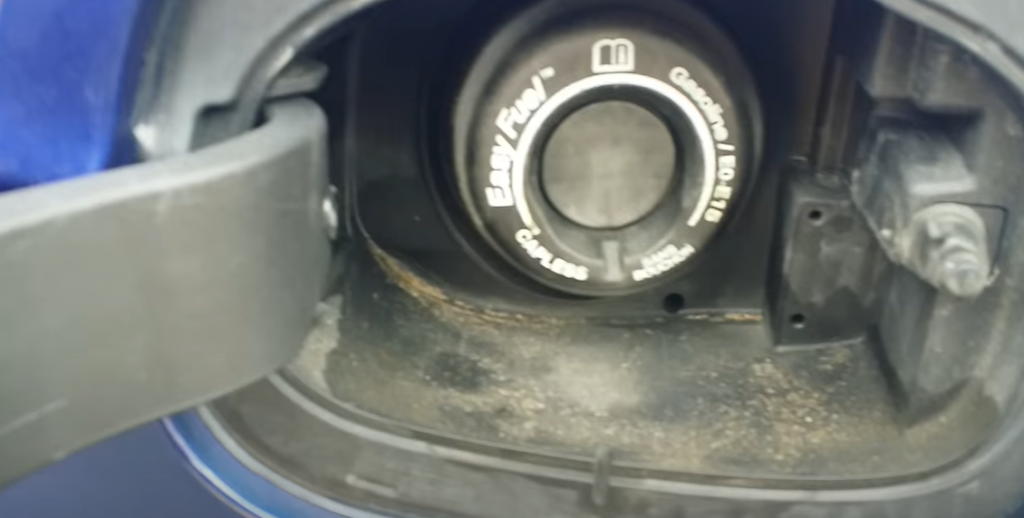
How to Learn to Handle a Gas Tank Accurately?
Handling a gas tank is a key part of being a responsible driver. It requires knowledge and care to ensure that you fill your tank with the right amount of fuel, accurately measure the distance between full and empty, and take precautions against potential hazards like leakage or explosion. Here’s how to learn how to properly handle a gas tank:
Research
The first step to understanding a gas tank is to do your research. Learn what type of fuel your car uses and familiarize yourself with the safety regulations for handling and storing gasoline. You should also read up on the signs of leaks or explosions, as well as how to properly ventilate an enclosed area when filling a tank.
Practice
Once you have become familiar with the safety regulations, it is time to practice. Ensure that you are in a safe environment when filling your tank. A well-ventilated area outdoors is best. Measure the distance between full and empty to determine how much fuel should be added, and use only unleaded gasoline.
Monitor
Regularly monitor your gas tank for signs of leaks. Look for any wet spots or fuel odors near the tank, and check for any drips when filling or emptying it. If you suspect a leak, take the necessary precautions to ensure that the area is safe and contact a professional for assistance. [3]
What are Normal Sounds for a Gas Tank?
The sounds of your gas tank are a good indicator of its health. Normal sounds coming from the tank generally indicate that it is working efficiently and not showing signs of wear and tear. If you hear strange noises coming from the gas tank, such as clanking, whirring or grinding, this could be an indication that there is a problem and it is worth getting your tank checked out to avoid any further damage. Common noises coming from a gas tank include gurgling, bubbling or hissing, all of which are normal and shouldn’t be cause for alarm. Keeping an ear out for strange noises can help you maintain the health of your tank in the long run.
It’s also essential to keep an eye on the temperature of your gas tank. If it is too hot, it could indicate that there is a problem and you should get it checked out as soon as possible. Keeping the tank well ventilated can help maintain the temperature and prevent any further damage from occurring. Additionally, make sure to check for any signs of rust or corrosion, which could be indicative of a bigger problem. [4]
To ensure that your gas tank remains in good working condition, it is important to take regular care and maintenance measures. Check for any signs of wear and tear regularly, lubricate any moving parts, and make sure to clean out the tank on occasion to prevent buildup of dirt or debris. Taking these steps can help you keep your gas tank functioning efficiently and safely for years to come.
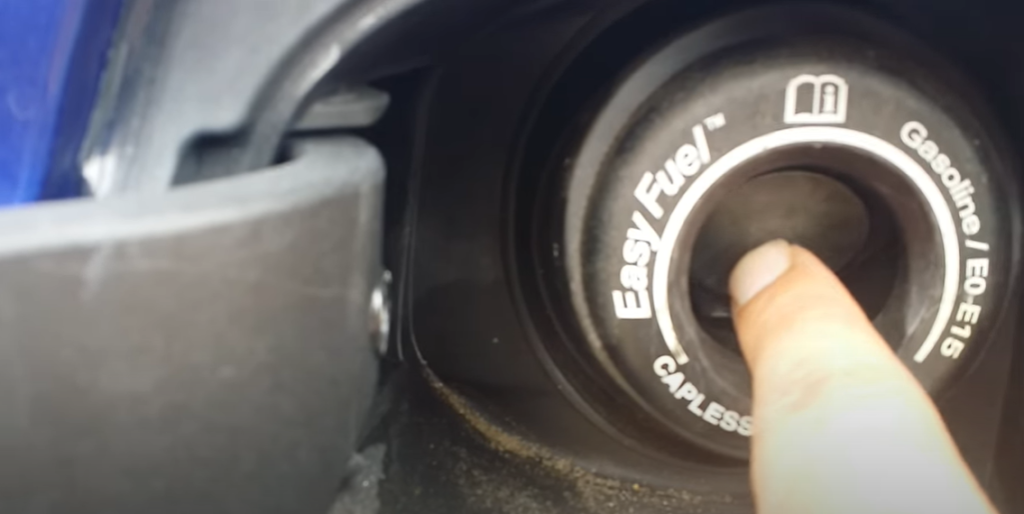
Key Reasons Of Why Does Your Gas Tank Make Popping Noise
We all know that a car’s fuel tank can’t be filled up forever. It has its own limit, and when we exceed the maximum limit of gas it is supposed to contain, it will start making some strange noises. But why does your gas tank make popping noises? Let us find out.
- Leaking Gas: One of the most common reasons why your gas tank makes popping noise is because of leaking gas. If you fill up the tank to its maximum capacity and it starts making a popping sound, then chances are that there’s a leak somewhere in the tank. This can be caused due to corrosion or any other wear and tear on the tank.
- Temperature: Another reason why your gas tank might make popping noises is because of the temperature. The gas inside the tank expands and contracts according to the temperature outside, and this can result in some strange noises coming out from your fuel tank.
- Condensation: When your car’s fuel tank fills up with gasoline, there is an abundance of oxygen in it, which causes condensation on the walls of the tank. This condensation can lead to popping noises coming out from your gas tank as it is trying to remove the moisture. So if you hear any strange sounds coming out from your fuel tank, it is probably because of this condensation problem.
- Improperly Sealed Gas Tank: If your car’s fuel tank has not been sealed properly, then the gasoline could be leaking out from it. This can result in a popping noise coming out from your gas tank as the gasoline is trying to escape.
- Pre-existing Problem: Last but not least, if you have been hearing strange noises coming out from your fuel tank for a while, then chances are that there is some underlying problem with the car itself. It could be something wrong with the fuel line or some other component related to the fuel tank. If that’s the case, then you should get your car checked out by a professional mechanic. [5]
These are just some of the key reasons why your gas tank might make popping noises. If you hear any strange sounds coming out from your fuel tank – get it inspected immediately to avoid any potential damage.
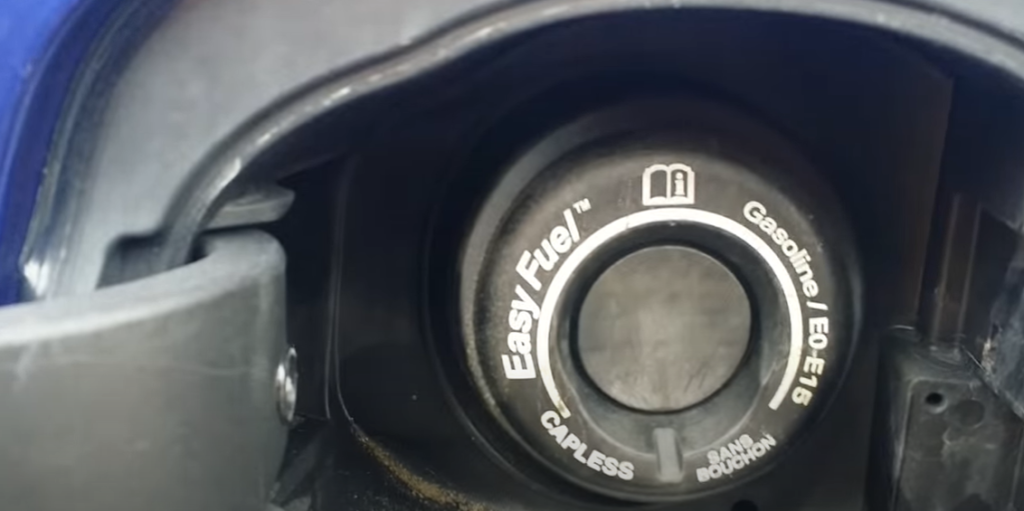
Troubleshooting Gas Tank Making a Popping Noise
Are you hearing a loud popping sound coming from your car’s gas tank? If so, it’s likely caused by an issue with the fuel level sensor. This guide will help you identify and solve any problems with the fuel level sensor that may be causing this noise.
Diagnosing the Problem
The first step in solving your problem is to diagnose the cause of the issue. Here are a few ways you can do this:
- Check for any visible damage to the fuel level sensor. If there is any visible damage, it’s likely that the sensor needs to be replaced.
- Inspect the wiring for any potential problems. Look out for corrosion or broken wires which could be causing incorrect readings from the fuel level sensor.
- Run a diagnostic scan on your car to look for any errors related to the fuel level sensor or other components in the system.
Fixing the Problem
Once you have diagnosed the problem, it’s time to get to work on fixing it! Here are a few solutions:
- If there is visible damage to the fuel level sensor, replace it with a new one. Ensure you use genuine parts and follow any instructions provided in the manual.
- Inspect and repair any damage to the wiring system. Check all connections are secure and there is no corrosion from water or other elements.
- If a diagnostic scan reveals an error, follow the instructions provided to resolve it. This could involve resetting the sensor or reprogramming certain parts of the system. [6]
Can a Gas Tank Give Off a Strange Smell?
Believe it or not, a gas tank can give off a strange smell. Most of the time, it’s due to condensation forming inside the tank. When this happens, tiny drops of water form and mix with the gasoline, producing a strange odor. But sometimes, there’s another culprit at work: bacteria.
Bacteria love to grow in wet environments, so the moist conditions inside a gas tank can create a perfect breeding ground. These bacteria produce a strong odor that will waft from your car’s vents if left unchecked.
Fortunately, there are several ways you can take action if you notice an odd smell coming from your gas tank. First, you can try adding fuel stabilizer to the tank. This will help keep the water content down and make it less hospitable for bacteria to grow. You can also try filling up with higher-octane fuel, which burns hotter and helps prevent condensation from forming in the tank. [7]
Finally, if you’re really worried about odors coming from your gas tank, you can always take it to a mechanic who can take a closer look.
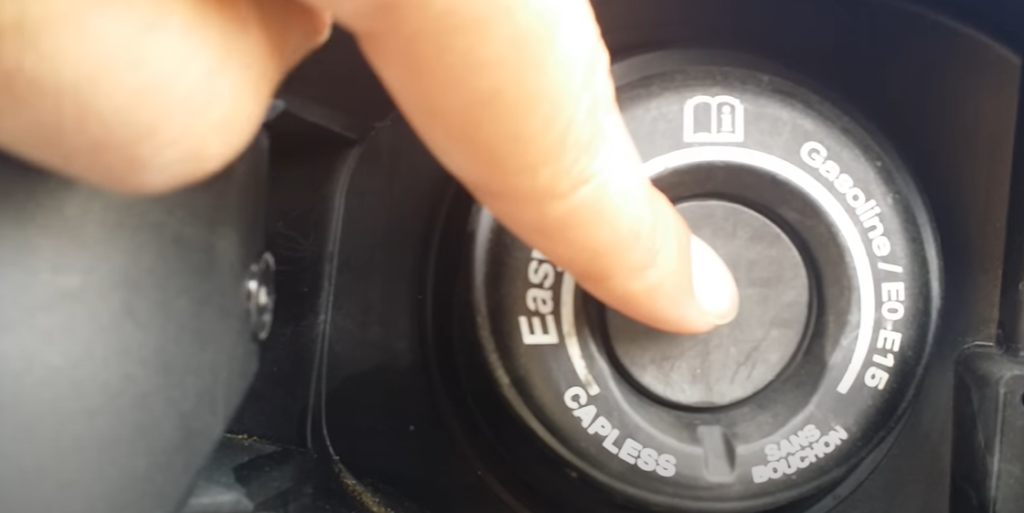
How to Maintain the Gas Tank?
Gas tanks are essential in keeping your car running safely and efficiently. To ensure that your gas tank is functioning properly, it’s important to keep up with regular maintenance. Here are some tips for maintaining your gas tank:
- Inspect the fuel tank for any signs of corrosion or damage on a regular basis. This includes checking the hoses, seals, and other components for leaks or cracks.
- Make sure that your fuel tank is filled with the appropriate fuel ratio for your car (usually around 90% gasoline and 10% ethanol). This will help ensure optimal performance.
- Avoid overfilling the gas tank, which can cause it to become pressurized and potentially lead to a leak or fire.
- Have your gas tank inspected whenever you get an oil change. This will help ensure that the fuel system is functioning properly and there are no leaks.
- If your car has a plastic gas tank, do not use any harsh chemicals or cleaners to clean it, as this can cause damage to the material.
- Use an appropriate fuel additive in the gas tank to help protect and maintain the engine.
- If you have a stainless steel fuel tank, make sure to keep it clean and free of rust or dirt buildup. Apply an appropriate cleaner for cleaning the metal surfaces. [8]
If you notice any signs of wear or damage, be sure to have it looked at as soon as possible by a qualified mechanic. This can help prevent any major damage to your engine from occurring and keep your car safe on the road. Additionally, if you ever notice any unusual smells or changes in performance, don’t hesitate to take your car to a mechanic for inspection. Taking these simple steps can help keep your gas tank in great shape and ensure that your engine is running smoothly.
How to Know When It’s Time to Have Your Car Serviced?
It’s not always easy to know when it’s time to take your car in for servicing. That being said, there are a few tell-tale signs that may indicate it’s time for a visit to the service center:
- Unusual Noises: If you hear any grinding, squealing, or other unusual noises coming from your engine, it’s a sure sign that something is amiss. Don’t ignore these sounds!
- Warning Lights: If you see any warning lights on your dashboard, be sure to take your car in for service immediately. Ignoring these indicators can lead to costly repairs down the road.
- Reduced Performance: If your car feels sluggish or unresponsive, it could be a sign of an issue with your engine or transmission.
- Oil Levels: Be sure to check the oil levels in your car regularly. Low levels can cause significant damage to your engine if left unchecked.
- Maintenance Schedules: Finally, always stay on top of your car’s scheduled maintenance dates. Regularly servicing and checking your car can help you keep it running properly for years to come. [9]
If any of these signs pop up when driving, take your car in for service! Doing so may prevent the need for costly repairs or replacements down the line.
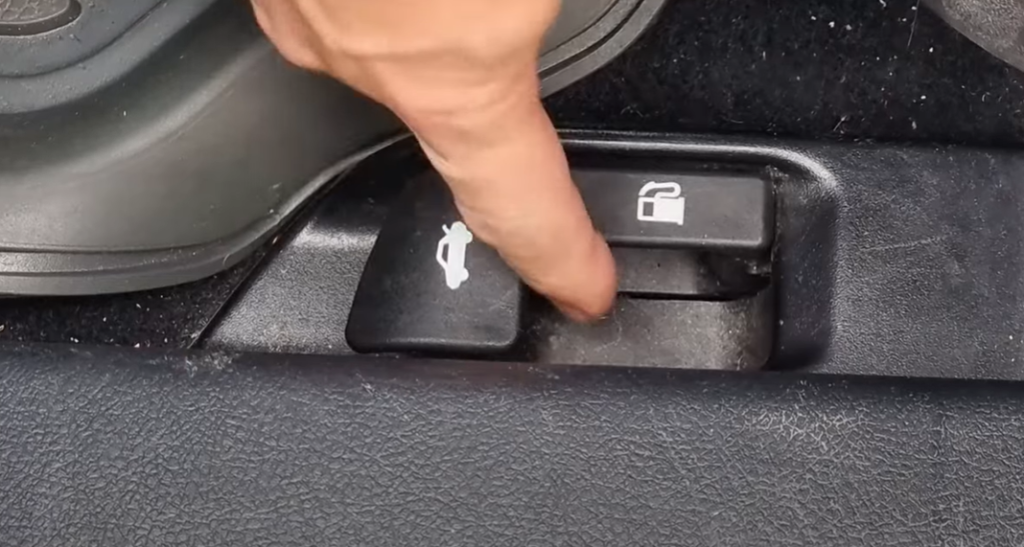
Who to Contact in Case of Car Failure?
It’s no secret that regularly servicing your car is important for its long-term health. But when should you schedule a service? Let’s take a look at some of the different types of services available and when they are needed.
Regular Service/Maintenance
It’s recommended that you have your car serviced every 12 months or 10,000 kilometers (whichever comes first). This service helps to keep your car running smoothly and prevent more costly repairs down the track. During a regular service/maintenance check, technicians inspect and change fluids needed for optimum performance as well as checking the brakes, belts, hoses and other parts of the car.
Specialized Services
It’s important to have specialized services done when necessary. This includes things like transmission repair, brake jobs, suspension work and other more complicated types of repairs that require a higher level of expertise. It’s recommended you take your car in for such service if it starts to exhibit signs such as jerky movements, odd noises, or a decrease in performance.
Self Attempted Repairs
It’s best to avoid trying to do your own repairs unless you have specialized tools and know-how. Not only could you end up doing more damage, but it may also invalidate the manufacturer’s warranty. If something needs repairing, always consult a qualified technician who will be able to diagnose the issue and provide a safe solution. [10]
How to Take Care of Your Car?
There are several key things to remember when it comes to maintenance:
- Always check your oil levels regularly. Oil is important for proper engine lubrication and helps to prevent excessive wear on parts. Having oil changes done at regular intervals (usually every 5,000-7,500 miles) can help keep your car running properly.
- Make sure that you change other fluids in the car such as antifreeze and brake fluid regularly to avoid any issues.
- Have your brakes checked once a year, or more often if you notice any problems. Brakes are essential for safe driving, so you want to make sure that they remain in good condition.
- Check tire pressure monthly using an accurate tire gauge. Properly inflated tires can help improve fuel economy and extend the life of the tires.
- Have your car inspected by a certified mechanic on a regular basis (every two to three years, or more often if you experience any issues) to make sure everything is running properly and that there are no hidden problems that may cause long-term damage. [11]
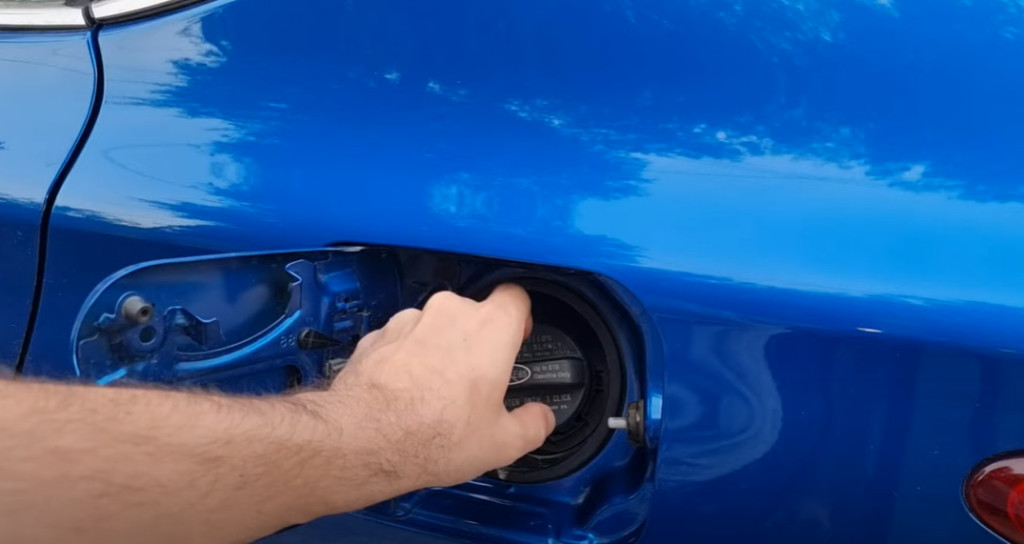
FAQs
Do gas tanks make noise?
Generally speaking, the noise a gas tank makes is minimal and usually goes unnoticed. In some cases, however, it is possible for a gas tank to make noises such as rattling or clanking if it is loose or not properly secured. If you think your car’s gas tank may be making an unusual noise, have a professional mechanic inspect it to make sure the problem is fixed. Additionally, it’s important to ensure your car’s gas tank is regularly serviced and inspected for any signs of wear or damage that could lead to a leak.
What does a failing fuel pump sound like?
A failing fuel pump can make a loud whining or buzzing noise, which may become more noticeable as the engine speed increases. If you hear this type of sound coming from your car, it’s important to have a professional automotive technician inspect and repair your vehicle as soon as possible to ensure its safe operation. Plus, they will check for any signs of damage to the fuel pump that could lead to a costly repair down the line.
How do I know if my fuel pump is weak?
If your car’s fuel pump is weak, the engine may experience a lack of power and struggle to reach higher RPMs. You may also notice a decrease in acceleration or a noticeable drop in fuel economy. If you suspect your fuel pump is weak, don’t hesitate to bring it to a professional mechanic for inspection and repair. This will ensure that your vehicle is running at its best and that you’re not wasting money on expensive fuel.
What does bad gas sound like?
Bad gas can cause a car to make loud knocking or pinging sounds. It is caused by the build-up of unburned fuel in the combustion chamber, which can lead to engine damage if not addressed quickly. If you hear these types of noises coming from your vehicle, it’s important to have your car inspected and serviced by a qualified mechanic to ensure its safe operation. In some cases, they may suggest replacing the fuel filter or performing a fuel system flush to restore your car’s performance.
Useful Video: Gas tank making noise
Conclusion
Breathe a sigh of relief – that pesky popping sound is no longer something you have to worry about. The easy solution is here and it’s time to take a break and enjoy your car! As long as you pay close attention to how your car is running, these problems can be avoided in the future. Drive safely, use the proper maintenance methods, and make sure you give yourself time to check for any issues as soon as you begin sensing them. Don’t forget, your car may talk to you when it needs something. Listen and stay safe on the road. Cheers to happy driving!
References:
- https://www.newkidscar.com/fuel-system/fuel-tank-construction/
- https://en.avtotachki.com/konstruktivnye-osobennosti-toplivnogo-baka-avtomobilya/
- https://blog.storemasta.com.au/safely-handle-gas-cylinders
- https://vehq.com/car-gas-tank-making-noise/
- https://carbasicsdaily.com/why-does-your-gas-tank-make-popping-noise/
- https://www.heroplumbing.com.au/blog/why-is-my-gas-heater-making-a-popping-noise
- https://www.repairsmith.com/blog/car-smells-like-gas/
- https://mcintoshenergy.com/how-to-maintain-your-fuel-tanks/
- https://www.protyre.co.uk/servicing/10-signs-your-car-needs-servicing
- https://germaniainsurance.com/blogs/post/germania-insurance-blog/2021/01/15/what-to-do-if-your-car-breaks-down-follow-these-4-critical-steps!
- https://www.bankrate.com/loans/auto-loans/top-car-care-tips/







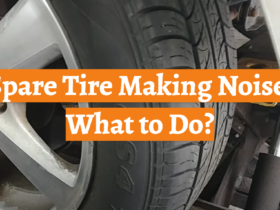

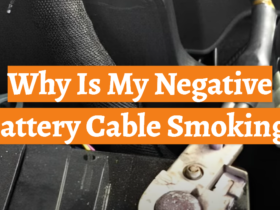
Leave a Review